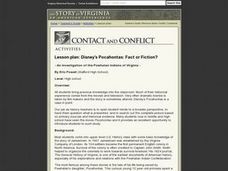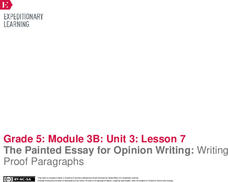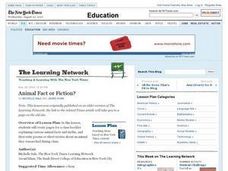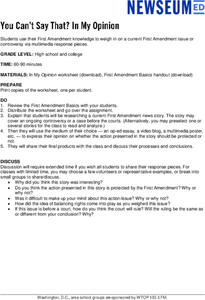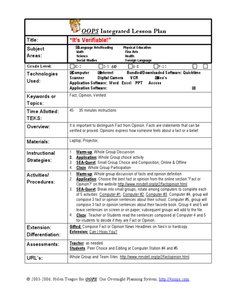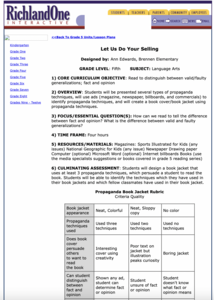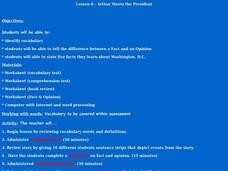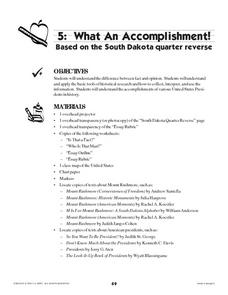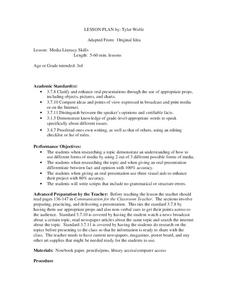Newseum
The Fundamentals of News
A short video introduces middle schoolers to different media-related news terms. Viewers then complete a worksheet and discuss the differences between news and journalism, between facts and opinions.
Newseum
Weighing the Arguments
To understand how personal perspectives can affect policy and politics, scholars examine the woman suffrage media map and historical artifacts to analyze arguments for and against women's suffrage. Class members then take on the role of...
Curated OER
Lesson 4: Fact and Opinion - Rosa Parks: My Story
Sixth graders examine implicit and explicit opinions in a text about Rosa Parks. In this explicit and implicit opinions lesson, 6th graders participate in direct teaching, guided practice, and independent practice while reading an...
Curated OER
Disney's Pocahontas: Fact or Fiction?
Did you know that Pocahontas was 12 when Jamestown was established? Did you know that she later married John Rolfe? Did you know that she lived in London for two years? Did you know that she died of small pox? Class members study the...
EngageNY
The Painted Essay for Opinion Writing: Writing Proof Paragraphs
It's time to proof read! Pupils read and analyze proof paragraphs from a model essay. They then practice writing their own proof paragraphs to express an opinion about offshore oil drilling.
Curated OER
Animal Fact or Fiction?
Read and discuss the article "Welcome to Cicadaville (Enter at Your Own Risk)" to gain a better understanding around the confusion regarding cicadas and locust swarms. In groups your young analysts research statements about animals to...
Curated OER
Bias
Students apply techniques of distinguishing between fact and opinion. Students identify words associated with persuasion and argument. Students read and categorizer a variety of newspapers and articles. Students identfy bias in a...
Curated OER
Fact
Students read about polar bears and discuss and identify the facts they learn about them. In this facts lesson plan, students explain why their facts are not opinions.
Curated OER
Identifying Facts
Students evaluate what a fact is and what the characteristics of a fact are. In this fact and opinion lesson, students read through chapters in their books and point out facts that they find that cannot be disputed.
Curated OER
Opinion
An important concept for youngsters to learn is that there is a difference between facts and opinions. Use Kirsten Hall's Animal Touch to introduce the idea that an opinion is how one feels or thinks about something and that others are...
Curated OER
Understanding and Using Primary and Secondary Sources in History
Explore primary and secondary sources in this historical analysis lesson. Young researchers define the terms primary source and secondary source. They read a primary source document provided by the teacher and answer questions about the...
Newseum
You Can’t Say That: In My Opinion
As a part of a study of the First Amendment, high schoolers research a current news story that seems to involve one of the freedoms granted by the First Amendment. Investigators decide whether they think the action presented in the story...
The New York Times
Evaluating Sources in a ‘Post-Truth’ World: Ideas for Teaching and Learning about Fake News
The framers of the United States Constitution felt a free press was so essential to a democracy that they granted the press the protection it needed to hold the powerful to account in the First Amendment. Today, digital natives need to...
Curated OER
"It's Verifiable!"
Students examine the differences between fact and opinion. They define fact and opinion, evaluate their favorite fact or opinion on a website, and in small groups write sentences using facts and opinions about school and their favorite...
Curated OER
Let Us Do Your Selling
Sixth graders analyze several types of propaganda techniques and create a book cover using the techniques. In this propaganda techniques instructional activity, 6th graders analyze the propaganda techniques used in various ads. Students...
Curated OER
Nutty About Peanut Butter
Learners brainstorm list of lunchtime sandwiches, identify difference between fact and opinion, research facts about peanut butter online, complete Nutty About Peanut Butter worksheet, and create their own fact and opinion worksheets...
Curated OER
Arthur Meets the President
Students read, Arthur Meets the President, and review the story using sentence strips and complete a book review activity with a partner. In this reading skills lesson, students work on fact and opinion and master fluency with...
Curated OER
What an Accomplishment
Students identify and discuss the images on the back of the South Dakota quarter. They discuss the differences between facts and opinions, and research information about the four presidents memorialized on Mount Rushmore.
Teaching Tolerance
Where We Stand
Everyone is entitled to their own opinion. Academics learn strategies to share their opinions and agree or disagree with others in a respectful manner. The resource provides scenarios to help individuals form opinions and share them with...
Curated OER
Determining Author's Point of View: The Sneeches
Determine the author's point of view in a text. Young readers read Dr. Seuss' The Sneeches and identify the author's purpose in the story. They identify persuasive techniques in writing, asking and answering questions to better...
Curated OER
Scapegoating and Othering
Scapegoating and "Othering" is the focus of a series of activities that ask groups to consider how these behaviors contribute to hatred and intolerance. Groups are given a scenario and discussion questions based on the situation. Whether...
Curated OER
Study Skills- Fact and Opinion
Learners engage in a variety of activities in order to achieve the objectives of a layered curriculum unit. They take notes on the differences between fact and opinion. Students also use a newspaper in order to recognize opinionated...
Curated OER
Media Literacy Skills
You're on camera! Third graders find a news story and research it to get more information. Everyone uses their found information to write a script and create their own news broadcast!
C-SPAN
Polling and Public Opinion
Most people are eager to offer their opinions about topics of interest, but what's the most effective way to collect and assess these opinions as a matter of fact? High schoolers learn about the history of polling, as well as the...
Other popular searches
- Fact Opinion Lesson Plans
- Fact and Opinion Passages
- Fact Opinion Worksheet
- Fact and Opinion Lessons
- Teaching Fact vs. Opinion
- Fact and Opinion Worksheets
- Teaching Fact and Opinion
- Fact and Opinion Games
- Reading Fact and Opinion
- Fact and Opinion Keywords
- Identifying Fact or Opinion
- Fact Opinion Quiz





